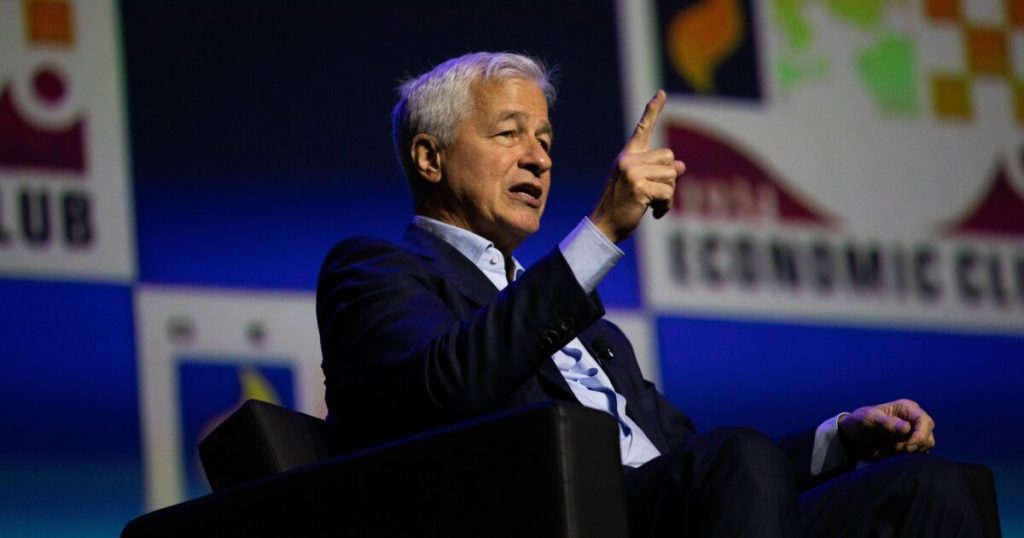Macro perils like a global nuclear arms race and the future of American trade alliances, along with
“The United States has had a rather healthy and steady economy for years, although it was already weakening as I began writing this letter — and that was before the recent tariff announcement,” Dimon wrote in the nearly 60-page address.
After President Donald Trump announced aggressive tariff policies last Wednesday, the stock market has been in a seeming free fall, leading economists — including
The bank’s CEO also used his note to
Here are some of the top takeaways from the letter.
1. Capital cushion
He said the bank has grown its excess capital to between $30 billion and $60 billion, depending on future regulations.
Dimon said the bank’s second capital priority, acquisitions, seem “hard to imagine” at this time.
He said he thinks stock buybacks should only be exerted when they benefit ongoing shareholders, instead of returning cash to exiting shareholders. He said share repurchases that “might be a no-brainer” become a stretch at certain valuations, which is why the bank hasn’t used up its capital generation. Although bank stocks have been walloped by Wall Street in recent days,
“We are very patient and don’t believe that there is any magic to the next 12 months, and, therefore, we look at excess capital as earnings in store or reserve — waiting to be used,” Dimon said.
In its fourth-quarter earnings — before the tariff announcements began coming out — Chief Financial Officer Jeremy Barnum signaled the bank could be ready to start increasing buybacks after growing its capital for nearly three years. Capital levels at the bank grew in the fourth quarter, with Common Equity Tier 1 capital ratio of 15.7%, and the bank repurchased about $4 billion in common stock.
“I’ve never thought having cash in your pocket is a bad thing,” Dimon said on the fourth-quarter earnings call.
2. ‘Our largest risk’
Last April, Dimon called the “free and Western world” a sine qua non. A year later, he wrote in his letter that “today’s world is more complex and more interconnected than ever before.” He said only the U.S. has the economic, military and moral power to handle the imperative action required.
Dimon listed “the war in Ukraine; terrorism in the Middle East and the real possibility that Iran may develop a nuclear weapon; Europe’s potential fragmentation; and ongoing trade disputes and the rise of China” as some of the global challenges.
He said economics and security are connected, but a global nuclear arms race is the “worst outcome that could happen to our world.”
The U.S. must set aside partisan divides to develop effective domestic policies and bolster its national security and military “at whatever cost” to “secure the future we should want for our country and our companies,” Dimon said. He added that many of the country’s relationships with allies exist because of the benefits they receive from the American military umbrella and strong economic ties.
For international megabanks like
“The success of
3. A snag in the American economy
While the economy is facing “considerable turbulence,” the U.S. has managed to avoid a major recession even as it navigated a pandemic, massive inflation and geopolitical pressures. Still, Dimon said in the letter “there is a really big ‘but’ about what is considered America’s exceptional economic performance” — the U.S. deficit of nearly $2 trillion.
“These large deficits are not sustainable — I do not know whether it will cause a real problem in six months or six years — the sooner we deal with it, the better,” Dimon said.
The U.S. must initiate comprehensive economic foreign policy to win the “new global ‘economic’ war,” he said.
Amid the tariff milieu underscoring the future of international trade, Dimon said his “most serious concern” is long-term economic alliances. He said whether tariffs would cause a recession “remains in question,” but they will slow down growth.
In conjunction with tariffs, the effects of quantitative tightening and the likelihood of increased inflation will impact interest rates — both those controlled by the Federal Reserve and the 10-year interest rates that are based on inflation.
He added that so-called stagflation — the confluence of high inflation, high unemployment and slow economic growth — didn’t stop rising rates in the 1970s.
“All of these cross currents and turbulence may take years to play out,” Dimon said. “It is almost impossible to confidently put them into a quarterly or even annual forecast.”
4. Culture question
Over the last few months,
In a section titled “Why complacency, arrogance, bureaucracy and BS kill companies,” Dimon scorned “dishonest numbers, failure to set standards, bad people, bad compensation schemes, disincentives, bad incentives, politics” as “cancers that kill companies.”
He said culture is created “by what you do and not by what you say.” Dimon took heat earlier this year for using expletives in a town hall about a new policy requiring bank employees to return to the office five days a week. Although he said he shouldn’t have cursed, after the audio from the meeting was leaked, he didn’t back down from the policy.
“Don’t give me the s*** that ‘work from home Friday’ works,” Dimon said during a February town hall.
The bank also renamed its diversity, equity and inclusion program, as government attacks on such programs have rapidly increased.
Dimon said, though, that the rebrand won’t change the bank’s responsibility to “create a stronger, more inclusive economy.” He also noted in the letter the need for the U.S. to tackle education system reform and health care system policies to reduce costs and improve outcomes.
Addressing climate change, he said, is important but should not overshadow other strategic imperatives.
Dimon also noted some of the bank’s activities financing oil and energy companies in a two-page summary of

